The post-Covid arts recovery must come from the grassroots
Coronavirus has caused devastation to the British arts, with venues still closed, others only partially open and job losses across the board. Greece has shown that it doesn’t have to be like that, writes Oliver Bennett

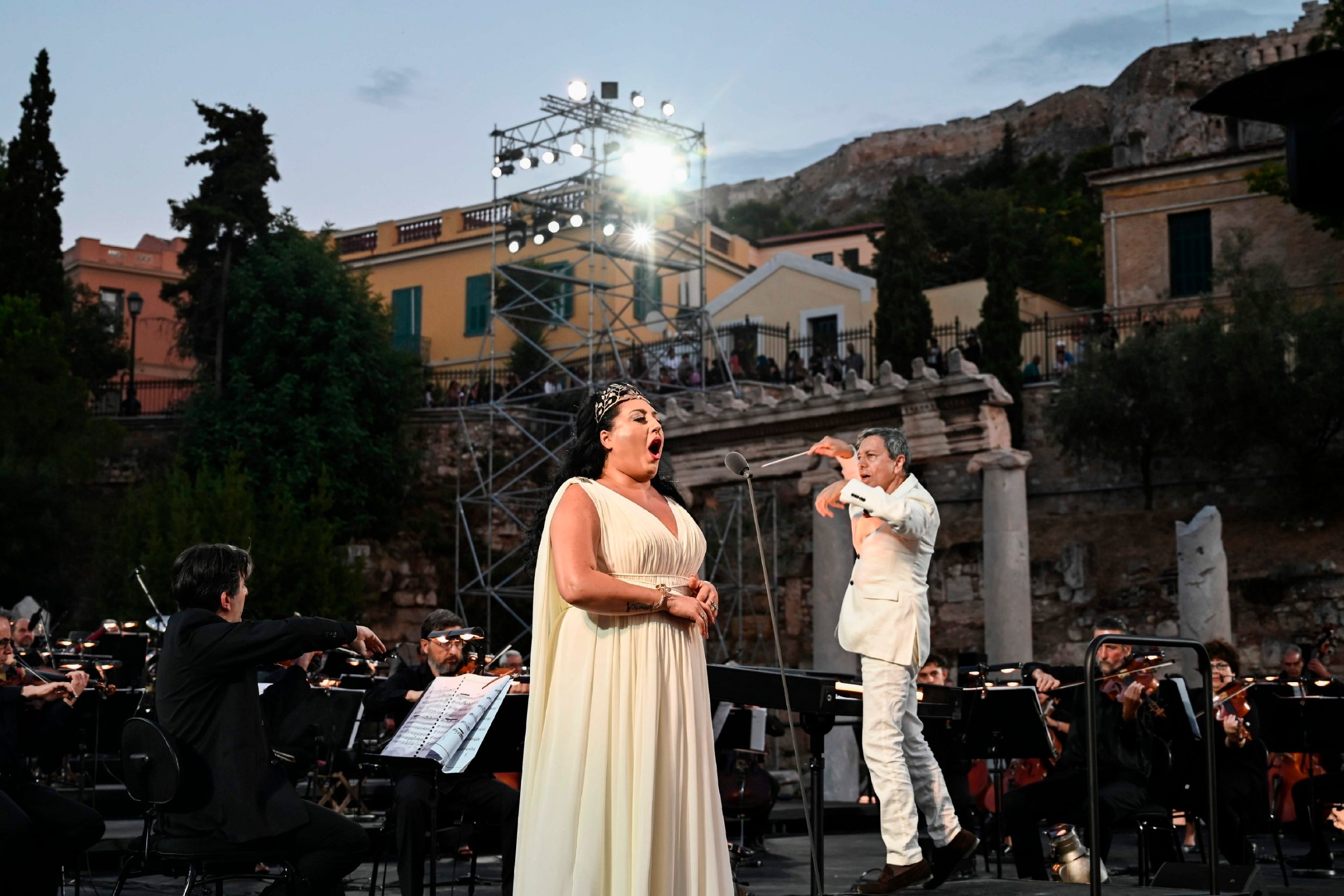
When the Arts Council was set up in 1946, its progenitor, the economist John Maynard Keynes, secured £235,000 to see the nation’s new arts body through its first year – about £10m in today’s money. A sense of national renewal was sorely needed. Understanding that the arts boost morale in stricken times, Keynes – who died in the council’s inaugural year – expressed the post-war vision in the council’s first annual report, inviting citizens to “look forward to a time when the theatre and concert hall and the gallery will be a living element in everyone’s upbringing and regular attendance at the theatre and at concerts a part of organised education”.
The particular cruelty of the coronavirus lockdown saw that we couldn’t (and still can’t) attend galleries, theatres and concert halls – even in the Second World War some museums including the Victoria and Albert Museum remained open to keep morale up and offer troops cultural sustenance.
In the Covid-19 washup, meanwhile, culture has hardly been the government’s top priority. Prior to Rishi Sunak’s £1.57bn bung in early July, described as “the biggest ever one-off investment in UK culture”, there had been an increasingly urgent drumbeat of closures and lost jobs, from Plymouth Playhouse and the Theatre Royal Newcastle to the Nuffield in Southampton. And although the bleeding has been slightly staunched, there’s still an ominous sense of delayed doom. Harrogate Theatre has announced it will not reopen again until spring 2021 – nor will Birmingham’s Hippodrome – and Ipswich’s New Wolsey Theatre, and Sheffield Theatres and the Crucible and Lyceum, will only run “pop-up” performances.
Job losses in theatres are running at about 5,000. An ITV News survey in late June via the Independent Theatre Council and the Music Venue Trust in June showed that 97.5 per cent of arts venues and companies said they were facing permanent closure. The National Theatre’s artistic director Rufus Norris added that social distancing would make theatres unviable as they would have to play to houses just 30 per cent full and Labour MP Margaret Hodge said regional theatres are particularly at risk “because they are even more dependent on the income they get from their audiences”. Dame Judi Dench weighed in – possibly blurring the line between drama and melodrama – that theatres may never reopen in her lifetime. Some venues will be saved by the £2.25m Emergency Grassroots Music Venue Fund from this month and the government’s Culture Recovery Fund, but for many, we can assume the worst.
And while theatre, music and the performing arts have been worst hit, museums and galleries are also under serious pressure. The Tate is to lose over 300 jobs and strike action is on the cards, while the mixed Southbank Centre – scene of the phoenix-like Festival of Britain in 1951 – has announced plans to make between 63 to 68 per cent of its workforce redundant and closure until 2021. The pandemic weighs heavily on the UK’s arts and culture sector. As Darren Henley, chief executive of the Arts Council, put it in a recent blog, “there will be closures, job losses and suffering. I am truly sorry for this, and we will do all we can to minimise the pain.”
The Treasury’s £1.57bn will filter through the system, mostly via Arts Council England, plugging gaps and alleviating hardship. No doubt, it’s a boon and came at a time when no one thought the government was going to notice the arts. But this finger-in-the-dyke approach illustrates an old suspicion – that in the UK culture is at the back of the queue. If Abraham Maslow’s hierarchy of needs was given a national twist, the arts would surely be down on the list – despite the £10bn a year that the arts bring into the nation’s coffers.
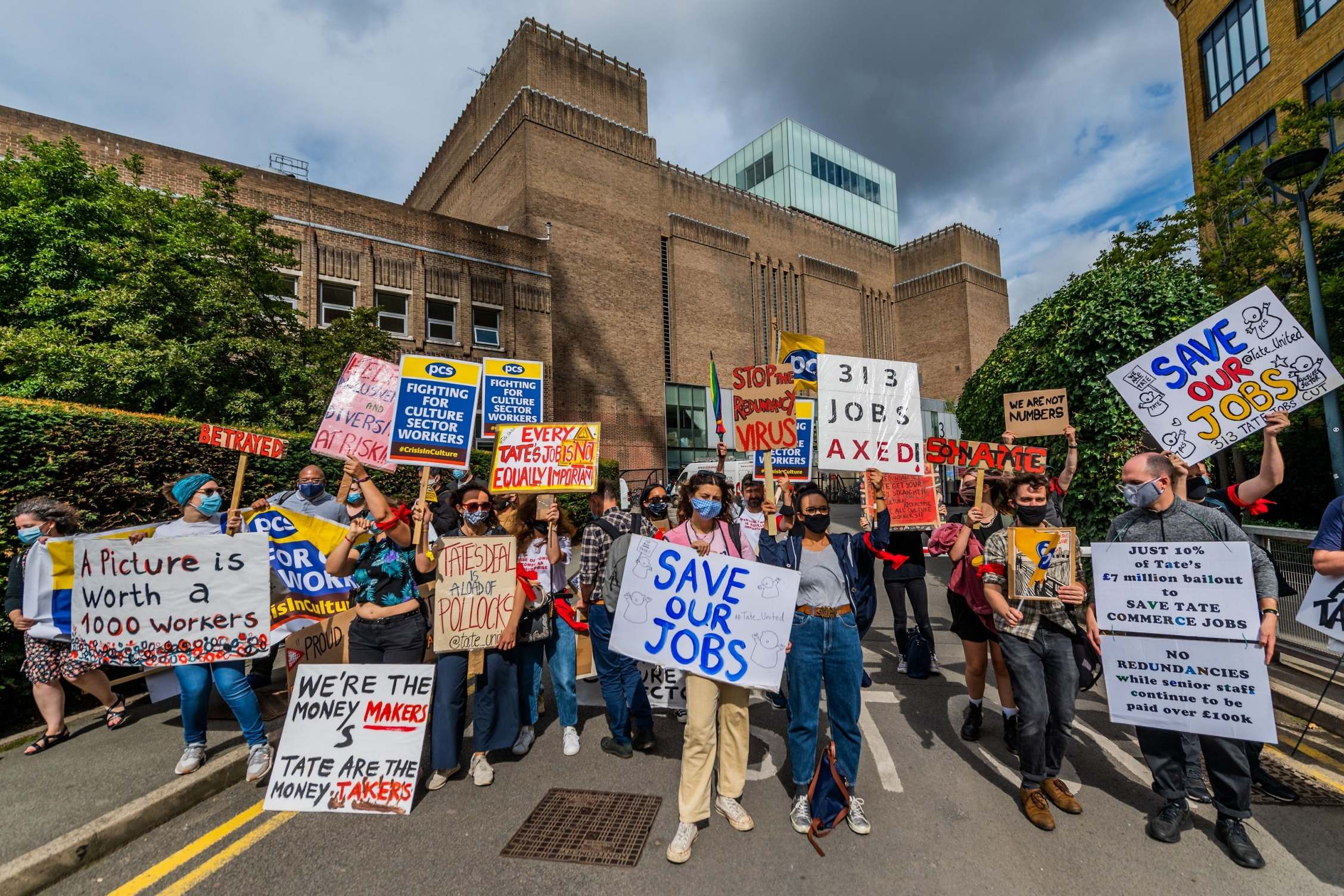
Could it be different? In Greece, which reopened with a grand cultural sally last month called “All of Greece, One Culture” – opera star Anita Rachvelishvili performed at its launch in Athens – the arts have been seen as instrumental to the country’s recovery. There are 20 new productions in 111 archaeological sites including the Agora of Athens till the end of September.
Culture is our social resin, so we turned to our own communities for it, including refugees. That’s the weight we carry in Greece and it’s always included in who we are
The composer and artistic director of the Greek National Opera, Giorgos Koumendakis – a kind of Danny Boyle of Greece, who was musical director of the 2004 Olympic Games – says that the arts have been a constituent part of the country’s post-Covid-19 reconstruction.
“From the outset Lina Mendoni [Greece’s minister of culture and sports] supported art and artists with a monthly salary so that people could afford the lost time,” says Koumendakis over Zoom from Athens.
But it’s also, he argues, that the arts is “part of our Greek DNA and part of ourselves”, and culture has been both a therapeutic device and a source of national unity in stricken times. “It makes the recovery possible, rather than being an effect of the recovery,” he says. And obviously, it’s part of Greece’s considerable tourism effort. “We’re opening our doors and stepping into a new reality,” says Koumendakis. “We’ve taken all the measurements for social distancing and we’re ready to open spaces and bring people culture after a very difficult year.”

Obviously, Greece has the significant advantage of being warm. Things can happen outdoors. But it’s also about the intention. Greece has had a renaissance in the arts since the 2004 Olympics, including the three-year-old Stavros Niarchos Foundation Cultural Centre – designed by Renzo “Shard” Piano – all despite the fact a decade or so on Greece is still reeling from the credit crunch and has borne a big proportion of the global refugee crisis.
“Culture is our social resin, so we turned to our own communities for it, including refugees,” says Koumendakis, adding that it brings forth the ancient memory of classical Greece. “That’s the weight we carry in Greece and it’s always included in who we are. But while we all try to face the modern world without the weight of antiquity, it grounds us and it’s very important to speak a universal language.”
Italy, similiarly, has an open air arts culture that has helped its post-Covid renewal, and this summer artists and arts organisations are moving outside across the country, staging open-air cultural events. In a moving homage to the dread days of February and March, Italy’s chamber of deputies and senate approved Bergamo and Brescia to be Italian Capitals of Culture 2023: a poignant symbol of rebirth for Italy’s viral epicentre. In France, meanwhile, Roselyne Bachelot has been announced as France’s new minister of culture, becoming the fifth person to take-up the portfolio in five years and has set aside $5.6bn (£4.2bn) for the culture sector post-Covid, comparing favourably to our £1.57bn. The German government has set aside more than €1bn (£900m) to protect the arts – in addition to a furlough scheme and grants for freelancers.
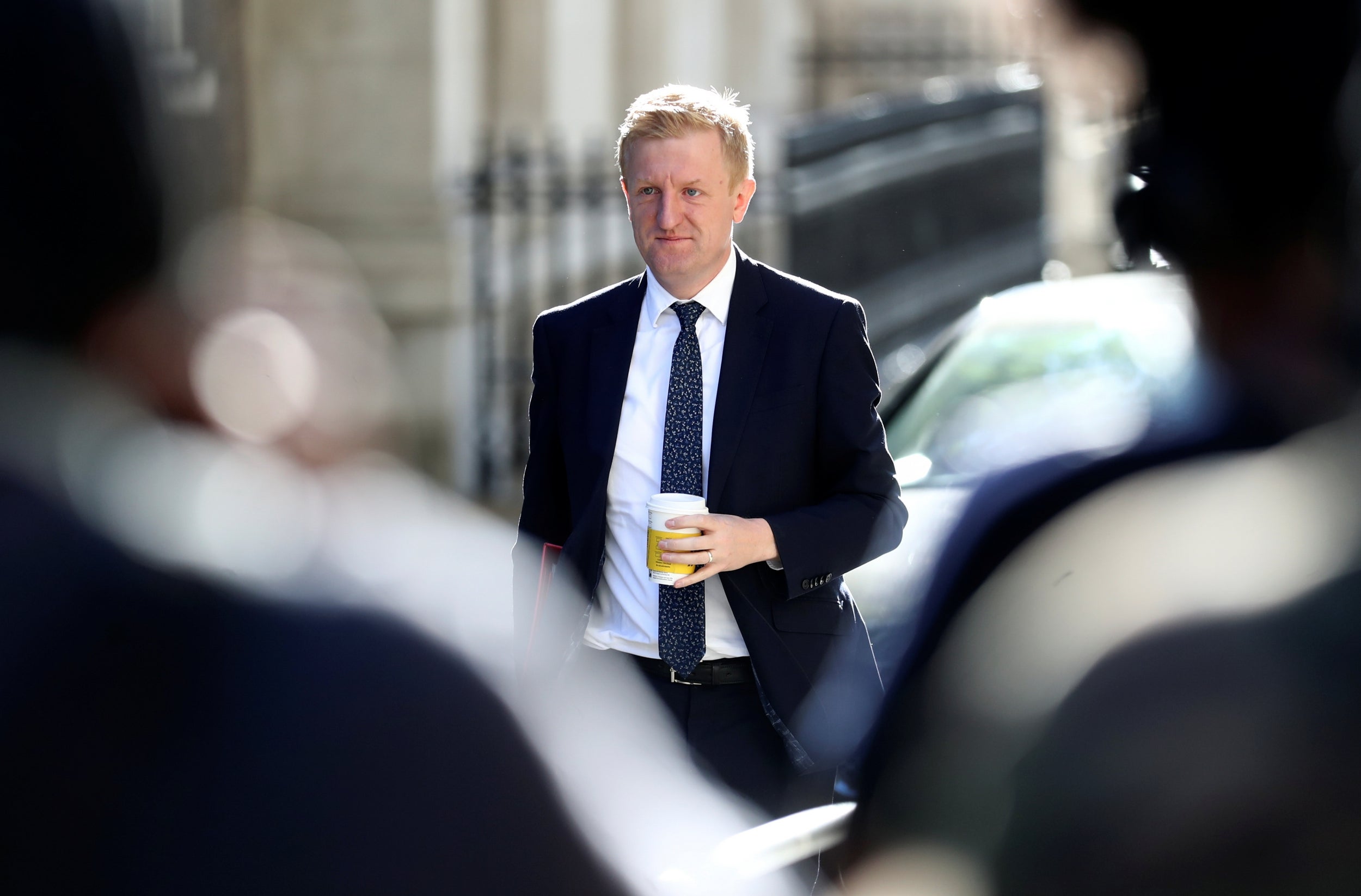
Could Greece’s more foundational approach to post-viral culture be taken up here? Culture secretary Oliver Dowden has said that “we need to find new and innovative ways for the arts to return in some form, without packing venues and risking a rise in infections”. His eight-person Culture Recovery Board taskforce includes Neil Mendoza as the new “recovery commissioner” who is currently trying to find “the strongest, most innovative ideas” for renewal.
My premise is that the arts is not just an asset or a product but a set of values. I want to bring a culture of trust and generosity rather than exclusivity
But perhaps the Covid-19 aftermath offers another opportunity: to rethink the arts as less of a “nice to have” consumer opportunity, and more of a necessity, knitted closely into our lives. To that end Gavin Barlow and Annabel Turpin of Future Arts Centres (FAC), which represents about 100 arts centres across the UK, think, pace Keynes, that the post-viral arts renewal could come from the grassroots, rather than the top down.
“The £1.57bn money has been seen as a ‘bailout’,” says Barlow. “We think it would be better to see it as a stimulus.” It could build on the quiet but extensive florescence of artistic activity that has happened during confinement, he says, and be locally focused.
“We’ve found a real flourishing of the arts in lockdown and a big increase in people being creative at home, particularly the young,” says Turpin. “Plus, lot of arts activity will happen locally because of travel restrictions and people’s attachments to their home areas.” This, she believes, could lead to new audiences when many of FAC’s 100 or so members reopen next month.
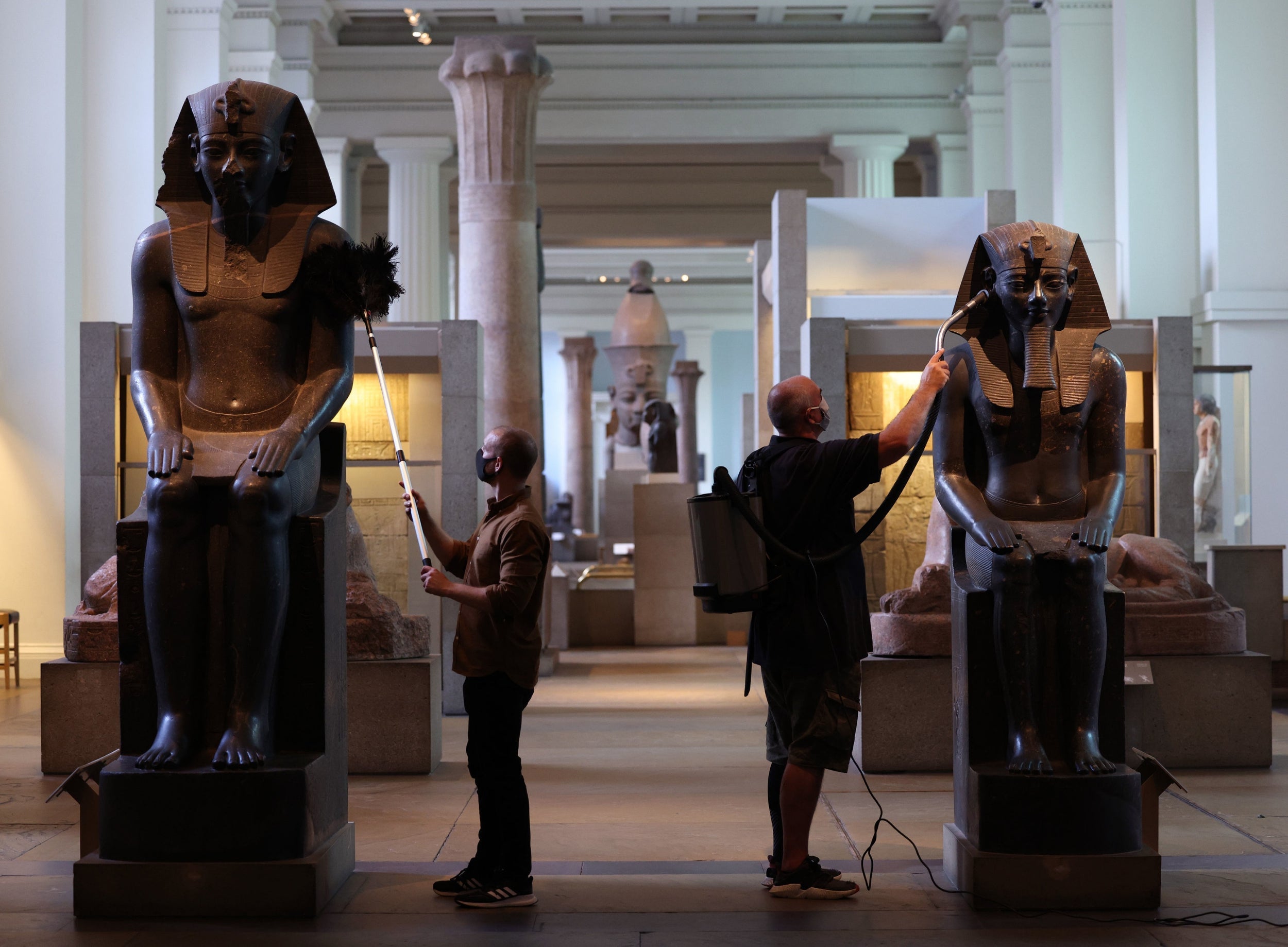
In the UK the biggest share of concern goes towards the so-called “crown jewels” of the Royal Opera House, British Museum and their ilk. But in the recovery could they become cogs in a wider mosaic of cultural renewal, rather than becoming a concentrate of monoliths in the capital? As Turpin says of her own arts centre, the ARC in Stockton, “We’re the ‘crown jewel’ of Stockton”, and Barlow’s Albany Theatre in Deptford hosts many southeast Londoners who, he says, “have never been to the Royal Opera House”. Local arts are cost effective and reach those who may not have the means or the inclination to go to the big beasts.
There have been all kinds of initiatives during lockdown attesting to a burgeoning “small is beautiful” approach. One is Turner-prize winning artist Wolfgang Tillmans selling posters of his (and Mark Leckey, Betty Tompkins and Andreas Gursky’s) artworks for £50 each – part of a fundraising campaign to give a boost to arts spaces “where a lack of audience is causing an existential threat”. There have been one-offs like DistDancing in London where dancers performed on the banks of the Regent’s Canal. Playwright James Graham has argued that theatre could come back with renewed vigour, with new work that is “raucous, joyful and hopeful” – and that the energy will come from a new localism.
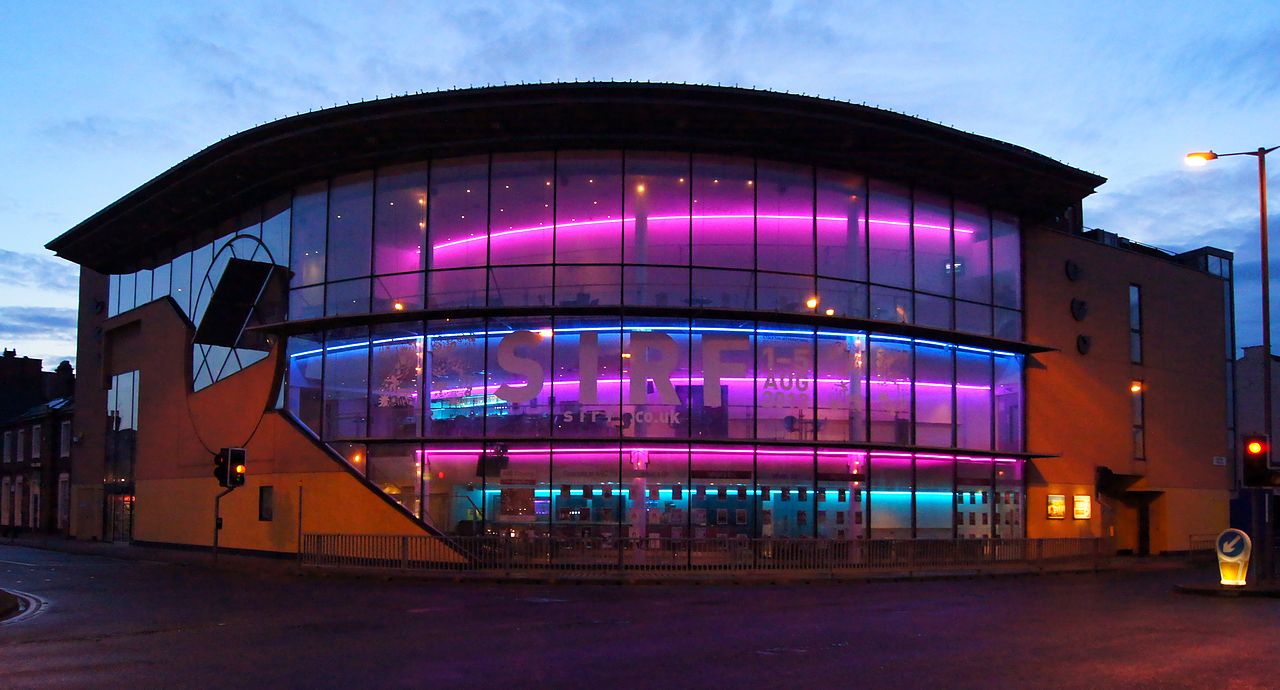
But perhaps the most exhilarating Covid-19 arts phenomenon so far has been the Artist Support Pledge from Sussex-based artist Matthew Burrows who started it on 17 March. Without expecting anything at all bar a few friends to show up, his modest proposal was to help a handful of artists ride the lockdown by selling their work on Instagram by way of a hashtag and invitation to sell their work for a limit of £200.
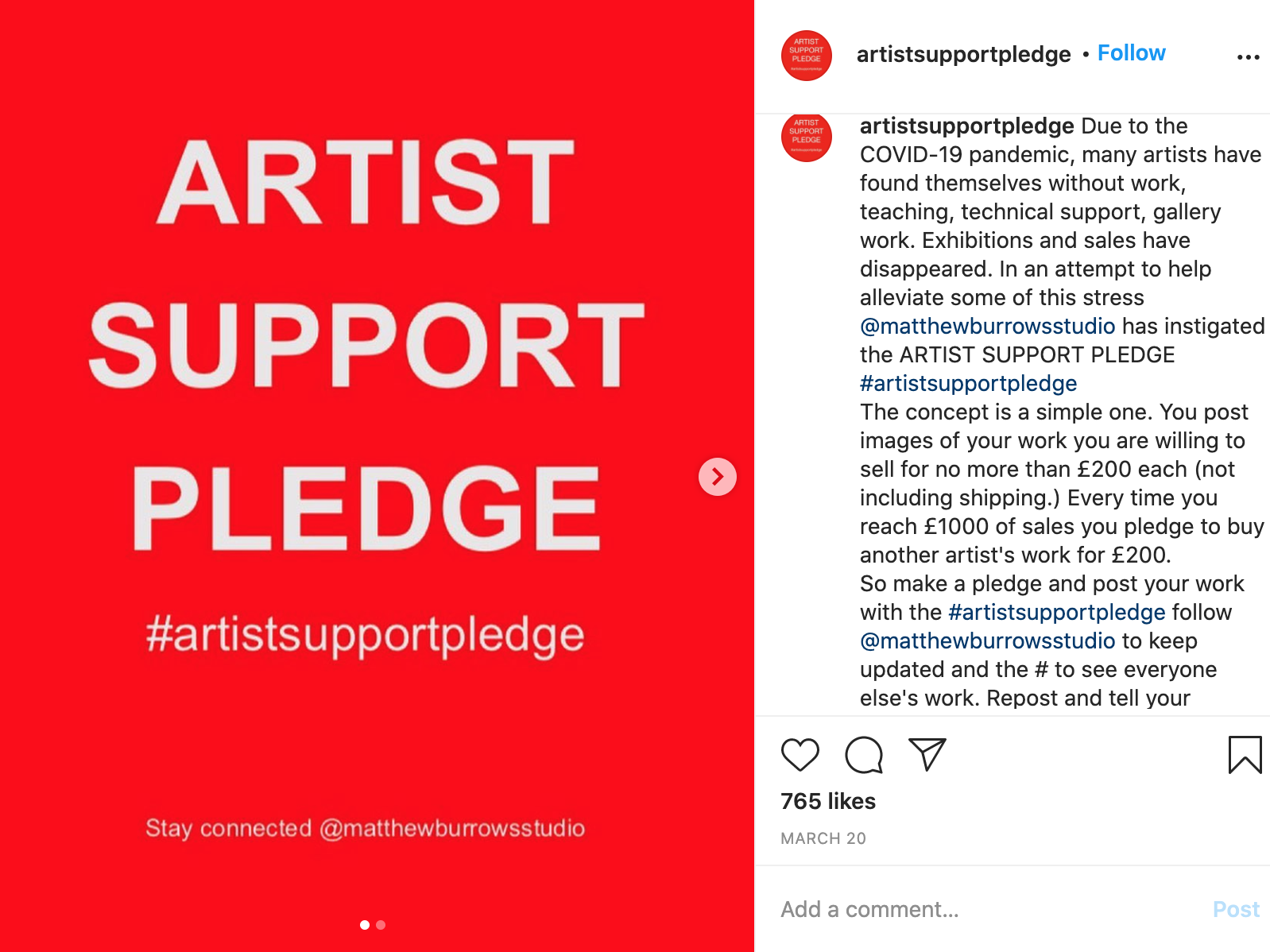
“We needed to work out a way to support artists and I wasn’t optimistic,” says Burrows. “I was the first to post and thought it would be a handful of people. But within 24 hours it went viral and international. I got two messages every second. It went around the world.” Now, he says, it has generated 350,000 posts from about 60,000 artists, and has sold about £65m worth of work so far.
Partly the success of the Artist Support Pledge (Burrows has now registered the name as a trademark) has been that anyone can join it. While Burrows says there have been “rough edges”, he encourages people to “self-police”, and says there have been few problems. “I didn’t expect it to be so successful.”
Galleries have been interested in the model – possibly wondering about the future of their bricks-and-mortar commitments. “I’m just a person with a phone and a laptop and I’ve been contacted by very well known people in the arts world,” says Burrows.
He won’t say who they are at the moment but is seeking to future-proof the idea beyond the Covid-19 period. And there has already been a small secondary market.
It could be argued that the Artist Support Pledge works for painting, illustrations, design and other artefacts, rather than performances. Burrows began thinking about how a similar model could work for literature and music but hasn’t taken those lines of enquiry any further, being somewhat overwhelmed with his core project. But the important thing about the Artist Support Pledge, he believes, is that it not only gives people a direct link to artists and their work but builds from a base of creativity.
Could initiatives like his help renew our relationship with the arts? Burrows hopes so. “My premise is that the arts is not just an asset or a product, but a set of values,” he says. “I want to bring a culture of trust and generosity rather than exclusivity.”
Keynes expected the post-war arts boom to be led by artists and as Darren Henley put it, “now, we’re turning our attention to rebuilding cultural and artistic life in our villages, towns and cities”. With the lessons of post-viral culture, this bottom-up approach might yet change the way we access and support the arts – and possibly, as in Greece, embed the arts in people’s lives.
Join our commenting forum
Join thought-provoking conversations, follow other Independent readers and see their replies
Comments